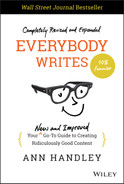Part V
Publishing Rules
Not long ago a company lifted some content that we at MarketingProfs had created. The thieves pinched it straight from our website in the dead of night, scrubbed it free of our branding and byline, and passed it off as their own.
That sort of thing happens all the time online: bots and meme accounts lift content and republish it wherever they please—with zero regard for copyright or author.
The increase in the number of channels and algorithm-driven platforms has made it both more tempting and (in some ways) confusing for creators.
It's hard to know when a podcast might be used as uncredited source material for a video, for example.
And: If content is freely available, does that means it's free to use? What's the difference between jumping on a social trend and outright plagiarism?
The MarketingProfs situation felt a little different to me. The stolen piece was something our team was particularly proud of: We had invested long hours in creating what we thought was nothing short of brilliant. (Our community loved it, too.)
The theft felt more like an ethical violation than straightforward copyright infringement, in other words.
And it felt personal because it was the theft of an idea and execution that we had spent long hours crafting—rather than just, say, a cut-and-paste of a one-off social post.
Content marketing and social media are an opportunity for brands … a huge opportunity to build trust and affinity. But when marketing is done sloppily (as it was by those thieves), it's a huge fail that will tick people off. It will also erode trust in you and damage your brand and your reputation.
Many companies are chanting the we're-all-publishers-now mantra—yet without a clear understanding of the ground rules of publishing and the ethics of journalism.
Thinking like a publisher isn't enough; we also need to act like one.
What does “acting like a publisher” really mean in a post-truth world, where objective facts are often tossed aside? When institutions we once trusted implicitly are no longer the trusted gatekeepers?
It means that we must cultivate our own brand credibility.
We should actually adhere more strictly to standards than mainstream journalists do, because people are naturally skeptical of something produced by a brand, says content management platform Contently.
“Content marketing should seek to adhere to stricter standards of reporting than traditional journalism, due to its different legal position and increased commercial motivations,” Contently cofounder Shane Snow writes in a kind of code of ethics manifesto.1
Shane implores us to adhere to journalism's foundational values of “honesty, integrity, accountability, and responsibility.”
Honestly, integrity, accountability, responsibility. Even in a fractured post-truth world, journalism offers us a foundation for how to ethically build trust with our audiences.
I'd also add generosity to Shane's list.
Generosity is a necessary mindset for modern-day creators. Sure, we need to freely and generously provide content that has real value for our audiences. That makes it easy for people to trust us and believe us—and also rely on us. You want your content to be so useful that they thank you for generously producing it.
And we should also generously acknowledge and credit source material.
Part V of Everybody Writes offers guidelines on how to act like a publisher by adopting some best practices from traditional journalism, including a broader awareness of the responsibility and privilege that come with building an audience. It also offers inspiration from how media companies tap into cultural trends to stay relevant and relatable.
Think of this part as Journalism School for Marketers, adapted for a digital age.
Note
- 1. Shane Snow, Contently's “Code of Ethics for Journalism and Content Marketing,” August 2, 2012, https://contently.com/2012/08/01/ethics/
